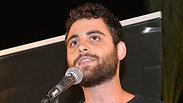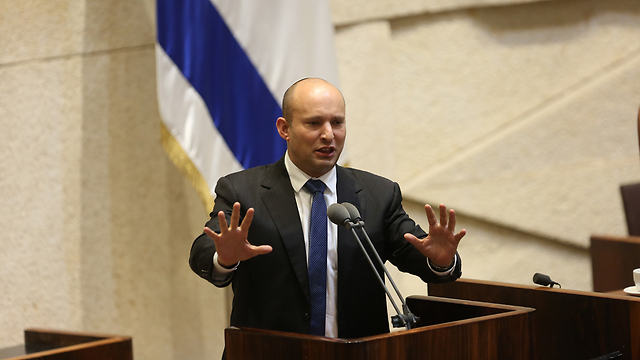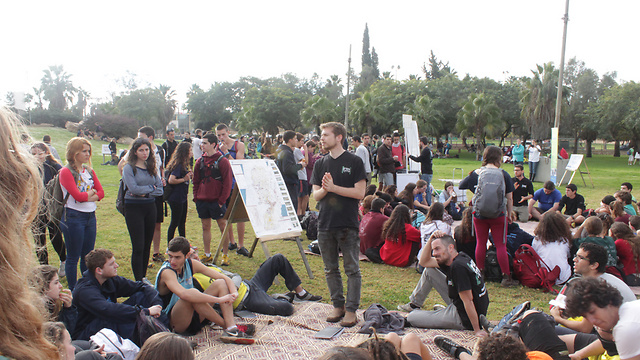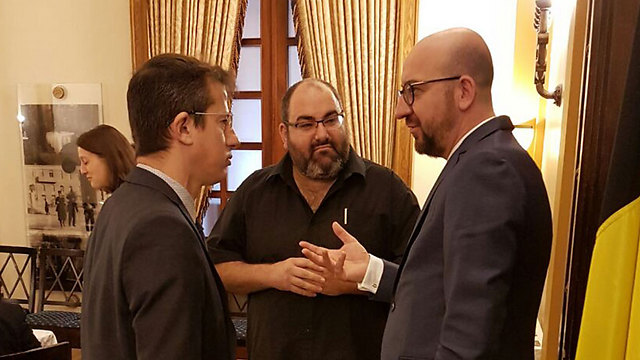
Knesset bans some left-wing groups from schools
'Breaking the Silence Law' passes 2nd, 3rd reading by 43-24, prohibiting activists who slander Israel and the IDF in international forum from entering school premises; Education Minister Bennett, who spearheaded the law, says 'Breaking the Silence crossed the line of legitimate dialogue a long time ago.'
The law will also apply to anyone who acts abroad who support institutions that delegitimize Israel, according to the bill's initiators, Education Minister Naftali Bennett and Shuli Mualem-Refaeli, both from the religious-nationalist Bayit Yehudi party.
Bennett welcomed the bill, which passed its second and third reading by 43 votes in favor and 24 against in the 120-seat Knesset.
“The reality in which organizations that undermine the legitimacy of the State of Israel and slander IDF soldiers will get to school children has ended today. Breaking the Silence crossed the line a long time ago of legitimate dialogue when they chose to to slander the State of Israel in the international arena,” he said.
“As long as they act against the State of Israel and the IDF, I will not allow them to operate in the education system. You want to operate? Operate at home. In the education system, the belief in shaping the future generation will not be expressed by such voices,” he added.
Bennett has been critical of the organization along with other right-wing politicians who accuse the group of damaging Israel's image abroad and putting soldiers and officials at risk of prosecution for alleged war crimes.
"Anyone who wanders around the world attacking IDF soldiers, will not enter a school," Bennett said in a statement.
Matan Peleg, CEO of the right-wing organization Im Tirtzu, who supported the bill echoed Bennett’s remarks.
“Anyone who operates on international stages against the State of Israel cannot do so inside Israel. The Knesset issued a red card today to all delegitimization organizations which seek to integrate into the education system. We hope that this law will lead to the ousting of other delegitimization organizations.”
Critics of the law said it was a blow to core democratic values like free speech and part of the Israeli government's effort to delegitimize rights groups and NGOs.
The amendment to the education act grants new powers to Education Minister Bennett to order schools to bar certain groups from giving lectures to students.
The legislation has been dubbed the "Breaking the Silence" law, a reference to the left-wing Israeli group of that name which collects and publishes testimony from Israeli veterans about the military's alleged misconduct against Palestinians in the West Bank and during conflicts with terrorists in Gaza. Its testimonies are often anonymous and major claims of instances of abuse by its leaders have been been refuted in the past by other eyewitnesses.
In November 2016, the State Attorney's Office decided to close the case against Breaking the Silence spokesman Dean Issacharoff, who claimed he assaulted an arrested Palestinian during his IDF service, citing lack of guilt.
The investigation into the incident found that Issacharoff claims "did not occur at all."
"There was no indication of the use of force, and the Palestinian claimed he was not beaten, not bruised, did not bleed, did not feel dizzy and did not pass out," the State Attorney's Office said.
In the course of the investigation Issacharoff was interrogated, messages were taken from his company commander at the time, Omri Seiner, and investigative materials were collected.
The victim inquestion denied that his arrest was accompanied by any kind of violence on the part of the soldiers, Issacharoff included, except for the use of necessary force to handcuff him, which was required in view of his opposition to the handcuffing.
Breaking the Silence said the law is meant to weaken it and other rights groups.
"It's really about trying to silence and cover up what's been going on in the occupied territories for 51 years," said the group's director, Avner Gvaryahu.
Ram Cohen, a headmaster at Tel Aviv's Tichonet high school, said he hosted Breaking the Silence at the school last year and planned to invite the group again, even if it meant breaching the law.
"As a principal, as an educator, it is my duty to stand up and say—no more," Cohen said. "These laws are meant to harm democracy. I shall not be a part of it. I do not agree with it and I shall object to it."
Amir Fuchs, who heads the Israel Democracy Institute's Defending Democratic Values Program, said the law was part of a wider phenomenon in Israel of trying to discredit left-wing groups.
"Education is about thinking critically. It's about hearing people you don't agree with. And this is what we want to teach our children," Fuchs said. "In order for us to educate our young people to be democratic, to be liberal, they have to hear the other side," he added.




















